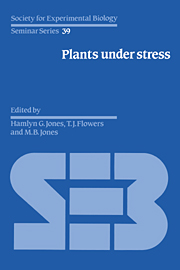Book contents
- Frontmatter
- Contents
- Contributors
- Preface
- 1 Introduction: some terminology and common mechanisms
- 2 The impact of environmental stresses on ecosystems
- 3 Whole-plant responses to stress in natural and agricultural systems
- 4 Photosynthesis and gas exchange
- 5 Regulation of growth and development of plants growing with a restricted supply of water
- 6 Stresses, membranes and cell walls
- 7 Desiccation injury, anhydrobiosis and survival
- 8 Molecular biology: application to studies of stress tolerance
- 9 Environmental control of gene expression and stress proteins in plants
- 10 Plant tissue and protoplast culture: applications to stress physiology and biochemistry
- 11 Breeding methods for drought resistance
- 12 Selection for physiological characters – examples from breeding for salt tolerance
- 13 Prospects for improving crop production in stressful environments
- Index
Preface
Published online by Cambridge University Press: 16 March 2010
- Frontmatter
- Contents
- Contributors
- Preface
- 1 Introduction: some terminology and common mechanisms
- 2 The impact of environmental stresses on ecosystems
- 3 Whole-plant responses to stress in natural and agricultural systems
- 4 Photosynthesis and gas exchange
- 5 Regulation of growth and development of plants growing with a restricted supply of water
- 6 Stresses, membranes and cell walls
- 7 Desiccation injury, anhydrobiosis and survival
- 8 Molecular biology: application to studies of stress tolerance
- 9 Environmental control of gene expression and stress proteins in plants
- 10 Plant tissue and protoplast culture: applications to stress physiology and biochemistry
- 11 Breeding methods for drought resistance
- 12 Selection for physiological characters – examples from breeding for salt tolerance
- 13 Prospects for improving crop production in stressful environments
- Index
Summary
The study of plant responses to stress has been a central feature of plant biologists' attempts to understand how plants function in their natural and managed (agricultural/horticultural) environments. In recent years, much progress has been made in understanding how stresses affect plant performance and consequently we considered it timely to examine the ecological, physiological and biochemical responses of plants to a variety of stresses with a view to identifying common principles. In particular we were interested to see if we are now in a position to evaluate ways in which this information might be applied by plant breeders, particularly through some of the newer methods of genetic engineering, to the development of more stress-resistant crop plants.
The chapters in this book were contributed by the invited speakers at a two and a half day meeting organised by the Environmental Physiology Group of the Society for Experimental Biology and held during the Society's annual conference at Lancaster in March 1988. The meeting was also supported by the Association of Applied Biologists and the British Ecological Society. The book is divided into three parts. The first is an introductory section (Chapters 1–3) which outlines essential concepts and considers the relative importance of different stresses as limiting factors for plant production. The second section (Chapters 4–7) concerns the behaviour of plants under stress at different levels of organisation, while the third section (Chapters 8–13) considers the application of this information on stress to crop improvement both through conventional breeding and molecular biology.
Information
- Type
- Chapter
- Information
- Plants under StressBiochemistry, Physiology and Ecology and their Application to Plant Improvement, pp. viii - xPublisher: Cambridge University PressPrint publication year: 1989
